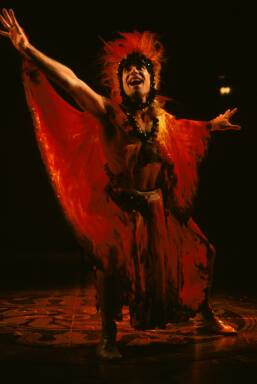|
The Tempest: Overlapping Plots & Themes |
|
Shakespeare's The Tempest contains
four overlapping cells of plot:
Of course, these are interrelated in many ways. Caliban is urging an
attack on Prospero, even as Antonio is urging one on Alonso. Ariel and Caliban represent
not only ends of the magical spectrum, but ironically opposite responses of those Prospero
controls. Indeed, one can conceive of the play as Prospero, along with Ariel at the
distant, overseeing center of the remaining cells, with the drunken trio the farthest
remove from that oversight, though always accounted for: |
||
Prospero (Ariel)--center of power and oversight |
Ferdinand and Miranda--the virtue of love and the blessing of marriage |
The Other Courtiers and Royalty--the interposition of loss and (potential) betrayal |
The Clowns and Caliban--the low class and the beastly |
Questions
|

